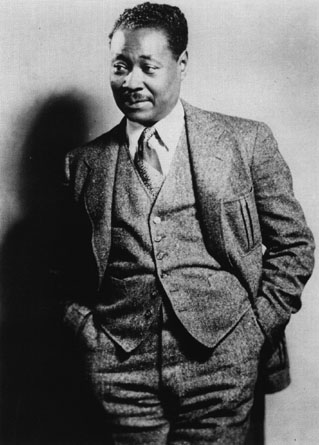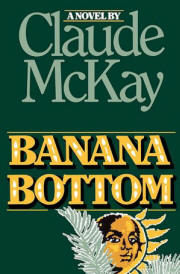It's well known that African American writers did not influence Ernest J. Gaines during his formative years as a writer. Instead, authors such as Hemingway, Faulkner, Tolstoy, Turgenev, and Joyce did. In 1975, Gaines did say, however, "Probably the only Black writer who has influenced my work in Zora Neale Hurston" (Carter 85). Gaines does not mention a specific text by Hurston, in the 1975 interview or in later interviews. So, I cannot say with certainty what Hurston text influenced him. It must be remembered that Hurston's work fell out of favor during her lifetime and it wasn't until the early 1970s that Alice Walker and others resurrected her. What fascinates me is the fact that Hurston served as an influence. This can be seen, of course, in Gaines' use of dialect. However, I am not interested in Hurston for this post. Instead, I am interested in Claude McKay.
Both McKay and Hurston were major figures during the Harlem Renaissance. McKay, a Jamaican born author, wrote the famous poem "If We Must Die" in response to the Red Summer of 1919. He also wrote Home to Harlem (1928), a picaresque novel that sees Jake, an African American soldier who deserts the Army during World War I, finding his way in the world, both abroad and in the United States. Gary Holcomb directly links McKay's novel with Hemingway's The Sun Also Rises (1926), arguing that the novel, instead of being a work that would cause DuBois to take a bath after reading it, is "a rewriting of the white author's art for black transnational purpose" (136). After writing Home to Harlem and Banjo (1929), both of which deal with the big city in the United States, McKay wrote Banana Bottom (1933), a novel that focuses on Bita Plant and her life and that of the community in Jamaica around the turn of the twentieth century.
Reading Banana Bottom, I could not help but think about Gaines and what may have been different if he read a work like this during his formative years. Just as Toomer could have affected Gaines' style indirectly through Hemingway, McKay's possibly did as well through Hurston. John Lowe points out the similarities between McKay's novel and Hurston's Their Eyes Were Watching God (1937) which she wrote while in the Caribbean. That discussion, however, is for another day. Here, I do not want to speculate on what would have happened if Gaines read McKay's novel early on, but I do want to point out the similarities between Banana Bottom and Gaines' work. As discussed in earlier blog posts, Gaines sought out books about peasants and peasantry when he entered the library in 1948. He found those books, but he didn't find "his" people in those books. Instead, he found European peasants and American whites. That is partly what inspired him to write.
McKay's novel deals with the peasantry in Jamaica, and it also contains the person who leaves, becomes educated, and returns to the community. Bita, after being "raped" at age twelve, gets supported by the local missionaries and sent to school in England. There, she becomes "educated" and returns to Jamaica, and Banana Bottom, about seven years later. The novel partly focuses on her navigating the "civilized" world of the white Europeans and the "native" world of her own community in Banana Bottom. In this way, Bita can be seen in relation to characters like Jackson and Grant in Gaines' works.
Apart from the central narrative of the novel that focuses on Bita, descriptions of the peasantry and more specifically conflicts between the local community and immigrants from India and China along with a migration of workers away from Jamaica to Panama for better opportunities appear. After the hurricane near the end of the novel, some of the Negro workers who had a large pay day clearing debris and wreckage took their money to Panama to make more working on the canal. Along with some of the workers leaving, the community "redoubled and grew in bitterness against the immigration of Chinese and the importation of Indian coolie labor" (294). This is only one example of the conflicting groups in the novel. The immigrants do not appear as characters like the Cajuns do in Gaines; however, they are present and take labor and wages away from the "Negro" workers.
This is just a brief discussion of McKay's novel and some similarities to Gaines' work. For a longer discussion, make sure you leave a comment below.
Carter, Tom. "Ernest Gaines." Conversations With Ernest Gaines. Ed. John Lowe. Jackson: University of Mississippi Press, 1995. 80-85. Print.
Holcomb, Gary. "Hemingway and McKay, Race and Nation." Hemingway and the Black Renaissance. Eds. Gary Edward Holcomb and Charles Scruggs. Columbus: The Ohio State University Press, 2012. 133-150. Print.
McKay, Claude. Banana Bottom. New York: Harcourt Brace Jovanovich, Inc., 1961. Print.


Hey everyone I never believed in herbal cure, & i have spend lot of money and time in trying to get drugs from the hospital/clinic to get cured of my Herpes virus which i suffered from for Two(2) years and i was tired of ( Val acyclovir ) drugs, herpes is a serious and recurring disease which can't be cured through drugs or injections by the American doctors but the best way to deal with herpes is by taking natural herbs medicine for it and is only few American doctors that know about this herbal medicine .. I have read about Dr.Igberafu the great herbalist doctor from Africa who can cure disease with his powerful herbs made with different combinations of natural roots, leaves and steams. for the people suffering from the following diseases, Herpes, Cancer, Als, Hepatitis, Diabetes, HPV, Infertility Infections ETC should contact him for his herbal medicine because I am a living testimony and I was cured of herpes. Although, I sent him what he requested and he sent me his herbal medicine which I took for 2 weeks and today when I went for a test I was tested for herpes negative. you can reach him through his email drigberafucaregiver@gmail.com or whatsapp number: +23470 57881342 / Phone +23470 57881342
ReplyDeleteWeeping may endure for a night but joy cometh in the morning. Keep saving lives with your roots and herbs Dr Ogudugu on YouTube herbal medicine
ReplyDeleteI can’t believe this is really true I never believe there is cure to this hsv 2 because all the hospital have told me there is no cure to it, few months ago I saw this man email DR OLIHA on internet from a testimony share by someone who he help with his herbal cure I contact his email and ask for his help also, that is how he inform me about the cure process and this man sent me a herbal medicine which I took according to the way he instructed for 2 week I can’t believe when I go for test my result come out negative i am so happy to share this to the world there is real cure to herpes you can also contact DR.OLIHA through his email now {oliha.miraclemedicine@gmail.com} and also WhatsApp him +2349038382931. .....
ReplyDelete